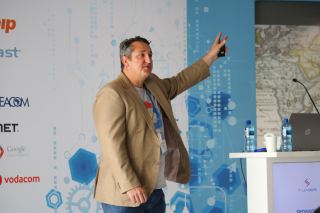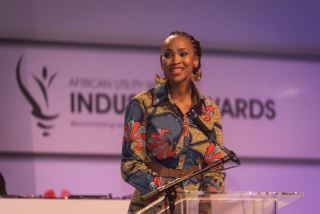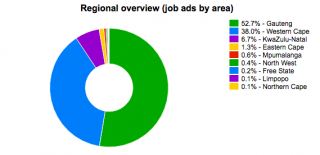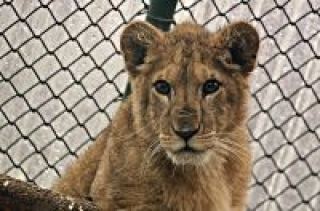Born at 33 weeks under challenging circumstances, Baby Joshua needs our help.
Joshua Naicker (22 months old) from Midrand, Johannesburg, was born at only 33 weeks old with challenging circumstances. The circumference of his head measured 45 cm, a length greater than his body, due to tremendous fluid on his brain.
Proud parents, Phillecia (29) and Bradley (36) were elated to welcome their first born into the world after 5 years of marriage and with uncomplicated family medical history, they could not have anticipated the difficult road ahead.Baby Joshua was diagnosed with congenital Hydrocephalus, more commonly known as “water on the brain”. This relentless and incurable disease currently affects 1 in every 500 babies globally.
At only 10 days old Joshua had already undergone his first brain surgery and spent the first two months of his life in Neonatal ICU, where he received a number of plasma blood transfusions to compensate for hemorrhaging large amounts of blood. He has since been fitted with a shunt (a thin piece of plastic tubing with a catheter), which drains the fluid from his brain to his stomach.
As a result of this rare disease Joshua has developed a number of serious conditionsnamely Cerebral Palsy (Hemiplegia), severe Cortical Visual Impairment, Hip Dysplasia, Epilepsy, Chiari Malformation, Scoliosis, missing Septum Pellucid, global developmental delay and hypertonia.
“He has had a total of 5 operations in his short existence, 3 of them being brain surgeries, uncountable hours of therapy and doctors appointments. His daily activities are so challenging and he cannot perform any tasks independently such as sitting, standing, crawling, playing, eating or drinking.” – says Bradley.
Despite his challenging circumstances, Joshua is described as a bubbly child, who loves affection.“He has the most beautiful smile, a smile that can capture anyone's heart. He exudes love and happiness. He has the true heart of a warrior.” – says Phillecia
“He has come such a long way and is getting very close to sitting and crawling each day. He is beating the odds and with the right treatment and therapy has a chance at developing normally.” – adds Bradley
With unexpected mounting medical costs, Joshua’s parents have appealed to the public for support and set up a campaign on donations-based crowdfunding platform, BackaBuddy hopes to fund raise a total of R400 000 for Joshua to undergo Stem Cell Therapy at Duke University in Durham, North Carolina.
“Stem cell treatment will help him have a better quality of life and we are hoping it will specifically help with his vision, as he is practically blind. Stem cells have the ability to regenerate and repair the damaged brain cells. Duke University has performed thousands of stem cell infusions specifically for children born with this condition. We are hopeful that the procedure will eliminate at least one of Joshua’s conditions” – says Bradley
Breakdown of medical costs:
- The estimated total cost of the first stem cell treatment will be around R344 700 allowing for exchange rate fluctuations or an approximate 10 per cent increase.
- Banking and processing the stem cells for infusion: R20 460HLA-typing of both siblings to confirm a match: R6 507Transporting the stem cells to America: R26 300
- Infusion of stem cells: R216 100
- Transportation and accommodation in America: R44 000
“From the time Joshua was born we have done our best to manage this extremely difficult and expensive situation on our own, but the financial toll on our family has been overwhelming and we need help. We cannot express our gratitude to everyone who has supported out BackaBuddy campaign. Donors have given our boy a chance at a life where he will encounter far less challenges” – says Phillecia.
Joshua’s campaign has thus far raised R45 498 towards his fundraising goal of R400 000 with contributions from 64 donors.Contribute Joshua’s medical campaign by donating here: https://www.backabuddy.co.za/hope-for-joshua
Participate in the Global Giving Survey to empower Charities in South Africa here
BackaBuddy a proudly South African crowdfunding platform where individuals have the opportunity to raise funds for causes they feel passionate about.BackaBuddy has raised over R65.6 million various causes and charitable organizations in South Africa.T
Take a look at our Website site https://www.backabuddy.co.za
For additional information, contact This email address is being protected from spambots. You need JavaScript enabled to view it. / 082 602 0735
Park Square Leads The Way For Future Forward Work Spaces
Rapid technological advancements have gifted people with the ability to redefine their work lives. Saying goodbye to the nine-to-five, many professionals around the world are now untethered from their desks, able to work remotely from anywhere and at any time thanks to WIFI, smartphones and a whole host of other tech savvy tools. The benefits of this work method have been lauded for increasing productivity and work-happiness in employees. While it seems work may have left the building, companies and employees are still in need of future-forward spaces to connect, collaborate and share ideas.
As a result, many office developments are responding to this need by providing considered work environments that emphasize openness, transcend the idea of the daily grind and encourage a healthy work life balance in campus-style and community orientated spaces.In a 2017 article for Director, Monica Parker a behaviourist and founder of organizational change consultancy, Hatch, whose clients include Microsoft, Deloitte and the BBC says, “People always need a place to come together, and while coffee shops are great, people still like to have a place they can call a work home. I don’t think work has left the building – there is still that communal driver.”Today, companies are understanding more and more the importance of nurturing productivity through the significant benefits of open and flexible office environments. These benefits include creativity, knowledge sharing, teamwork and coordination. While Google, Apple and various other tech advanced companies have been operating like this for decades already, South Africa is just beginning to ride the crest of the flexible and open work wave.
Cue Park Square, Nedbank’s iconic R1billion mixed-use office and retail development located within uMhlanga’s New Town Centre and thriving commercial hub. Bordering the popular CJ Saunders Park and featuring innovative commercial and retail offerings, Park Square with its considered restaurants, shops and coffee bars will offer a connected work culture incorporating a unique leisure offering seamlessly linked to a vibrant and open urban square. The Four Star Green Star-rated building, due for completion in October this year, includes 36 000m² of commercial space, 4 000m² of retail and an impressive 3 500m² open public piazza. Furthermore, it’s easily accessible to pedestrians, offers abundant parking and is close to a GO!Durban Integrated Rapid Public Transport Network (IRPTN) stop. Ken Reynolds, Nedbank Property Finance Divisional Executive, property expert and Director of Nedport Developments, a subsidiary of Nedbank and Park Square’s developers says, “Projects like Park Square are effectively turning the South African urban planning paradigm around.
This innovative and connected space encourages people to think beyond the boardroom, take time to unplug and to connect with one another. By similarly drawing the surrounding communities for shopping and relaxing, the overall effect is a sociable, communal space that emphasises a convenient and balanced work life experience.” Park Square has already secured a series of high profile tenants including Nedbank, Spar and the IBV International Vaults.
Spar Marketing Manager, Travis Anderson says, “Customers no longer want to shop in large centres. They want the convenience of parking, walking straight into the building, doing their shop and walking straight out. We love Park Square because of its convenient location in a fast-developing area and its proximity to the CJ Saunders park which will allow us extra exposure as we piggy back off activities held there.” Reynolds says, “If you can imagine your day like this; arrive at work with your barista-made coffee in hand, in a reusable mug of course, use the morning for planning and responding to mails followed by a quick jog around the park at lunch, tuck into an artisanal deluxe sandwich bought from the Spar then attend afternoon meetings and drinks in the Square with your new client? Then you have imagined a day at Park Square.” Not forgetting profitability, a positive work environment increases productivity and in turn can have a significant impact on a company’s success. A reduction in staff downtime having amenities within walking distance of employee’s desks also reduces stress, as well as the lunch-hour rush with staff being able to avoid having to leaving the campus for their various requirements – from healthcare to lunch and even a spot of recreational shopping. Reynolds says, “Park Square offers mutual benefit for the employer and the employees with its unique commercial and lifestyle aspects. This world-class destination offers a win-win situation for both, where staff benefit by working in an open, future-forward environment and companies reap the rewards on their bottom line,” he concludes.
To explore investment opportunities, contact Samantha Stewart (082 903 0828/ This email address is being protected from spambots. You need JavaScript enabled to view it.) or visit: www.parkquare.co.za to find out more.
CHILDREN IN SOUTH AFRICA SHOULD THRIVE, NOT ONLY SURVIVE
There are currently 18.6 million children living in South Africa and the statistics tell a harrowing tale of a struggle for survival:
- 56% of children live in households beneath the poverty line with an income of less than R635 per month.
- More than 50% of children are subjected to violence.
- Only 44% of all sexual assault cases against children are reported to the SAPS.
- 34.8% of children in SA are subjected to physical abuse.
- 65% of South African children do not live with their biological parents.
- 3 children are murdered in South Africa daily.
Violence against children is costing South Africa a shocking estimated R239 billion per year!
Source: SA Child Gauge 2017, Children’s Institute
National Child Protection Week (27 May to 3 June) is commemorated annually in South Africa to promote awareness of children’s rights as per the Children’s Act of 2005.
The National Care and Protection Policy is a statement of the Government of the Republic of South Africa’s (GRSA) commitment to pursue a rights-based developmental approach to childcare and protection that ensures all children are guaranteed their rights to not only survive but also to develop their full potential, as well as advance the country’s national developmental goals as indicated in the National Development Plan 2030.
The NDP identifies a number of services critical to equalising and optimising the development of all children especially the most vulnerable. These services include early childhood development services, education, basic services and adequate nutrition, and safe and inclusive communities and families.
Despite the long-standing commitment, some twenty years after the adoption of the developmental approach, the majority of South Africa’s children remain socially excluded. They are denied their rights, trapped in poverty, exposed to high levels of violence and are prevented from developing their full potential.
Who are the most vulnerable?
- Children living in poverty
- Children living in multi-problem families
- Orphans
- Child-headed households
- Young children under the age of 6 years
- Children with disabilities
- Children living on the streets
- Children exposed to violence
What are the risk factors?
Children in South Africa face multiple risks that have an impact on parental caregiving capabilities and the survival and development of children to reach their full potential. These include:
- Children with chronic or mental illness or disabilities are at a greater risk of neglect and abuse;
- Very young children whose brain development are vulnerable to biological, social and environmental risk factors;
- Economic pressures and poverty, which limits the availability of resources for parents to meet children’s basic needs and support their development;
- Substance abuse amongst parents and caregivers as well as children themselves;
- Lack of care in the absence of parents leaving young children unsupervised;
- Parents of a young age, with low levels of education or too many dependent children;
- Disrupted caregiving due to the death of a parent, or abandonment, separated or divorced parents;
- Parental lack of understanding a child’s developmental needs;
- Mental health issues in the family;
- Exposure to violence in the family and community;
- Societal attitudes and cultural practices that promote the acceptance of violence against children, such as purported discipline;
- Limited social networks and supportive services.
Badisa in Partnership with the Department of Social Development
Badisa is a registered social service organisation delivering child protection services as set out in the Children’s Act. As a result, they are key role players in communities and in the lives of vulnerable children.
Statistics show that Badisa has provided child protection services to 23 977 children, of which 657 were abused, 511 were sexually abused and 2 235 neglected over a period of one year. It also includes 171 street children, 493 abandoned children and 422 orphans. Of the above cases, 3 452 relate to inadequate parenting.
Badisa statistics for 2016/7
| Areas of Service | Number of Beneficiaries |
|---|---|
| Social work programmes (prevention, early intervention, statutory services, re-integration and community work) | 766 910 |
| ECD Daycare Centres | 1249 |
| ECD Home-based Daycare | 457 |
| After School Care Centres | 281 |
| Child and Youth Care Centres | 691 |
| Adoptions and Pregnancy Counselling | 1769 |
Ensuring that Children thrive, benefits Everyone
Ensuring that children thrive is good for society and tapping into their potential provides one of the greatest opportunities to effectively transform South Africa over the next twenty years. However, if we are serious about achieving these sustainable development goals we need to invest in creating safer homes, schools and communities.
Learn how YOU can invest in transformation today. Visit www.badisa.org.za to consider your options.
Transformation a critical discussion point at the IT Leaders Africa Summit
“Embracing change in an era of ‘business unusual’” #ITLA18
The 9th Annual IT Leaders Africa Summit was recently hosted at the brand new, green star-rated CTICC East Wing in Cape Town on 9 & 10 May 2018. Over the past decade of existence, the event has quickly established itself as the premier gathering of CIO’s and business IT professionals on the continent. Attendees from across Africa congregated in Africa’s tech hub to share best practices, and discuss the strategic roadmap to managing the evolving challenges, opportunities and risks associated with the IT departments’ ever-increasing scope of technology implementation and its related oversight.
Brett St Clair, CEO of Siatik and renown international speaker – delivered a powerful warning to the audience; “disruption is happening incredibly quickly; especially in the IT space – there are so many technologies that are hitting IT, wave after wave – and each technology generates another wave of technology, which can be very scary as the rest of the world feels like it is doubling efficiency and leap-frogging ahead whilst we continue to lag behind in Africa – constantly having to catch up.”
A common thread shared by the audience and speakers alike was that digital transformation is turning the industry on its head, and the CIO of the future needs to be well ahead of the curve to be able to deal and effectively counter the effects of prospective disruption to organisations. Transformation was also discussed on a higher level and resulted in a robust and thought-provoking debate regarding the duty of leading IT professionals to not only upskill existing staff as opposed to looking outside for talent; attendees also challenged the IT industry as a whole to work towards the development, mentoring and nurturing of millennials and more importantly women in the IT field.
Nithen Naidoo, Managing Director of Snode, who participated in the newly introduced sponsor hot seat panel discussion, encouraged the IT industry to invest in the development of future IT practitioners as this will set organisations on a sustainable path to success, “Millennials are looking for purpose – they want what they do to mean something; they want to add to something greater than themselves - and if you give them that, your organisation will be able to attract the right kind of talent…desire and [corporate] cultural fit is really important”.
This was a sentiment shared by Jamie Whittaker, Deputy CIO at Discovery, who encouraged organisations that want to succeed where others have failed, to take an ‘out-of-the-box’ approach, “In order for organisations to be successful, they need to understand that they should embrace change – It’s not business as usual but rather business as unusual”. Whittaker further elaborated that “IT is not about technology; it’s not about apps, databases or mainframes, nor the cloud – what it’s about, is People – they are the most valuable resource – they should be mentored and nourished, when you find these individuals; they should be treated correctly from the very first interaction with your organisation. Make sure that we invest in developing our people, so that they can leave at any stage, but treat them well so that they choose to stay.” The overarching message was that, change may be scary, but it should be embraced and seen as an opportunity as opposed to a threat.
The array of IT experts present at the event discussed other critical themes which are affecting the IT profession, including improving organisational cyber resilience in a world of evolving and increasingly sophisticated cyber attacks through continuous collaboration between big companies and SME’s in order to create a sense of community around the issue of cyber security. Naidoo cautioned organisations to stop viewing cyber security protection as a grudge purchase “cyber security wins battles in boardrooms, it’s a competitive advantage”.
Harnessing the true potential of data was also on the top of everyone’s minds with Collin Mamdoo, Principal IoT Specialist at Vodacom calling for “data democratisation”, with many others echoing this sentiment and encouraging both anonymous and visible sharing of data between companies. Overall, everyone acknowledged that data analytics is a key part to business success; the question rather centers on how you put that data together; which is contextual to your environment, industry, company and maturity according to Peter du Plooy, CIO of Engen, futurist and former Visionary CIO of the Year Award recipient.“Organisations that are winning; are organisations that are doing immense amounts of data analytics – they’re understanding their broader ecosystem…their customers, understanding their business inefficiencies and they are improving all of these things”.
This was a sentiment shared by Greg Groenmeyer, Head of IT Strategy & Architecture at Sanlam, “it is important for IT to be aligned to the business agenda and the overall business strategy; IT departments must always evaluate whether anything that is introduced has a business narrative – activities must be centred around mitigating the risks or improving the bottom line”
The IT Leaders Africa Summit has been providing IT executives with practical knowledge from industry experts and thought leaders since its inception 9 years ago. With the assistance of an advisory panel of experience C-level IT executives, the summit covered the most current trends translating business strategies into IT functions, as well as many controversial and interesting debates on the future of IT in business.
“It has been exciting to witness the growth of the event as the IT industry matures. Kinetic is committed to strengthening the IT industry across the African continent through our involvement as a key information provider and business facilitator. We are encouraged by the number of companies who have already expressed interest in anticipation of the next edition later in 2018 which will be co-hosted alongside the Afrisecure Cyber Security Summit in Johannesburg” says Terry Southam, Managing Director, of Kinetic – the conference organisers.
In closing, Whittaker cautioned attendees that “Companies need to be looking for a business strategy for the digital age; if there are companies that consider business and IT to be two separate elements; they’re ripe for disruption”.
Follow @ITLeaders on Twitter and join the conversation using the #ITLA18 hashtag
For more information about IT Leaders Africa, visit: www.itleaders.co.za
About IT Leaders Africa
The IT Leaders Africa Summit has been providing IT executives with practical knowledge from industry experts and thought leaders since its inception 8 years ago. With the assistance of an advisory panel of experienced C-level IT executives, the summit encompasses the most current trends concerning translating business strategies into IT functions, as well as cyber security, governance, and disruptive technology. We have recruited the top IT executives in Africa to present on the issues concerning IT leaders in today’s rapidly evolving market to ensure that you are ahead of the curve.
About Kinetic
Kinetic is an international conference and exhibition company established as a key strategic information provider to the IT and Telecoms sector, our mission is to equip senior management executives with knowledge, market intelligence and viable commercial opportunities.
Indian energy companies ready to do business at African Utility Week
“India’s power sector is one of the most diversified in the world”
“Indian utility vendors and services will find a huge market and scope in Africa, especially in South Africa’s energy sector” says Dr. Rajeev Singh, the Director General and CEO of the Indian Chamber of Commerce (ICC). The ICC represents India at the upcoming African Utility Week from 15-17 May in Cape Town, hosting a pavilion of more than 45 suppliers of specialised technology and services for the energy sector.
Dr Singh says “the primary objective of the ICC is to connect with over 7000 industry professionals across the full spectrum of the sector to address today’s challenges and implement tomorrow’s solutions.”
He says visitors to the Indian pavilion at African Utility Week will be able to “interact and network directly with Indian vendors who have specialized in the energy sector. Visitors can also see the products and services covering generation, transmission & distribution, metering, renewables and new technologies. Visitors can furthermore establish distribution channels.”
Vibrant entrepreneurial culture
Asked what the African continent can learn from the experience of the Indian utility sector, the ICC CEO says: “Indian power sector is undergoing a significant change that has redefined the industry outlook. Sustained economic growth continues to drive electricity demand in India. The Government of India’s focus on attaining ‘Power for all’ has accelerated capacity addition in the country. At the same time, the competitive intensity is increasing at both the market and supply sides (fuel, logistics, finances, and manpower). Total installed capacity of power stations in India stood at 334,146.91 Megawatt (MW) as on February, 2018.”
He continues: “the Ministry of Power has set a target of 1,229.4 billion units (BU) of electricity to be generated in the financial year 2017-18, which is 50 BUs higher than the target for 2016-17. The annual growth rate in renewable energy generation has been estimated to be 27 per cent and 18 per cent for conventional energy. African nations can get a lot of trade benefits if they consider investing and doing business in India.” Dr Singh adds: “India’s power sector is one of the most diversified in the world. Sources of power generation range from conventional sources such as coal, lignite, natural gas, oil, hydro and nuclear power to viable non-conventional sources such as wind, solar, and agricultural and domestic waste.”
Founded in 1925, the Indian Chamber of Commerce (ICC) is the leading and only National Chamber of Commerce operating from Kolkata, and one of the most pro-active and forward-looking chambers in the country today. Its membership spans some of the most prominent and major industrial groups in India.
The full interview with Dr Singh can be read here: http://www.african-utility-week.com/IndianPavilion-interview
Award-winning energy platform
The 18th annual, multi-award winning African Utility Week will gather over 7000 decision makers from more than 80 countries to discuss the challenges, solutions and successes in the power, energy and water sectors on the continent. Along with multiple side events and numerous networking functions the event also boasts a seven track conference with over 300 expert speakers.
The African Utility Week expo offers an extensive technical workshop programme that is CPD accredited, free to attend, and offers hands-on presentations that take place in defined spaces on the exhibition floor. They discuss practical, day-to-day technical topics, best practices and product solutions that businesses, large power users and utilities can implement in their daily operations.
Industry support
African Utility Week has also already secured other important industry support including Lucy Electric as diamond sponsors, Eskom Rotek Industries, Hexing, Landis+Gyr and Sensus as platinum sponsors and Aberdare, Empire Utility Solutions and SAP as gold sponsors.
African Utility Week is the flagship energy event organised by the multi-award winning Spintelligent, leading Cape Town-based trade exhibition and conference organiser, and part of Clarion Events Ltd, based in the UK. Other well-known energy events by Spintelligent are Future Energy Nigeria and Future Energy East Africa. More events include Agritech Expo Zambia, Property Buyer Show, DRC Mining Week, Eduweek, Farm-Tech Expo Kenya, Nigeria Mining Week and the Mining Baraza in Kenya.
Dates for African Utility Week:
Conference and expo: 15-17 May 2018
Awards gala dinner: 16 May 2018
Site visits: 18 May 2018
Location: CTICC, Cape Town, South Africa
Website: http://www.african-utility-week.com
Twitter: https://twitter.com/AfricaUtilities #AUW2018
Linkedin: African Utility Week
Contact: Senior communications manager: Annemarie Roodbol
Telephone: +27 21 700 3558
Mobile: +27 82 562 7844
Email: This email address is being protected from spambots. You need JavaScript enabled to view it.
Finalists announced for African Utility Week Industry Awards show continent-wide success and buy-in
The fifth annual African Utility Week Industry Awards received nominations from far and wide for the 12 different categories celebrating excellence in the energy and water industries. The finalists have been announced for the awards which honour pioneering utilities, projects and people in the energy and water industry on the continent during 2017/2018.
The awards gala dinner takes place on 16 May and forms part of the African Utility Week conference and expo taking place at the CTICC in Cape Town. This year, two new categories were added, namely excellence in energy or water journalism as well as digitally advanced utilities.
The finalists for the African Utility Week Industry Awards 2018:
Lifetime Achievement Award
• Siengui Apollinaire KI, Secretary General, Western African Power Pool, Burkina Faso
• Alex Gisagara, Director of Engineering, National Water and Sewerage Corporation, Uganda
• Irene Muloni, Cabinet Minister for Energy and Minerals, Uganda Ministry of Energy, Uganda
• Roland Schulze, Professor Emeritus of Hydrology Centre for Water Resources Research School of Agricultural, Earth and Environmental Sciences, University of KwaZulu-Natal, South Africa
• Elijah Sichone, Executive Secretary, Regional Electricity Regulators Association of Southern Africa (RERA), Namibia
Outstanding Contribution Award: Water
• Anthony Turton, Professor Centre for Environmental Management, University of Free State, South Africa
• Paul Yillia, Research Scholar (Water Programme), International Institute for Applied Systems Analysis, Austria
• Silver Mugisha, Managing Director, National Water and Sewerage Corporation, Uganda
Energy/Water Reporter of the Year Award
• Emeka Anuforo, Senior Energy Correspondent, Guardian Newspaper, Nigeria
• Chris Yelland, Energy Reporter, EE Publishers, South Africa
• Fredrick Mugira, Coordinator and Editor Water Journalists Africa Network, Uganda
• Sally Ngakanyanga, Independent Journalist, Zimbabwe
• Newton Sibanda, Freelance journalist, Zambia
• Saya Pierce-Jones, Reporter, Smile90.4 FM, South Africa
Outstanding Contribution Award: Power
• Mouhamadou Makhtar Cisse, CEO, Société Nationale d’électricité du Sénégal (SENELEC), Senegal
• Herta von Stiegel, Executive Chair, Ariya Capital, Kenya
• Ana Hajduka, Founder & CEO, Africa Green Co. United Kingdom
• Jean Bosco Mugiraneza, CEO, Rwanda Energy Group Limited (REG), Rwanda
• Mateus Magala, President of the Board of Directors (CEO), Electricidade De Moçambique, E.P., Mozambique
• Chris Prengels, CEO, Tiger Power, Belgium / Tanzania
Power Utility of the Year Award
• Compagnie Ivoirienne D’Electricite (CIE), Cote d'Ivoire
• Société Nationale d'électricité du Burkina Faso (SONABEL), Burkina Faso
• Electriçidade De Moçambique, Mozambique
• Public Utilities Corporation, Seychelles
Water Utility of the Year Award
• Office National de l'Eau et de l'Assainissement (ONEA), Burkina Faso
• National Water and Sewerage Corporation, Uganda• Sénégalaise des Eaux, Sénégal
Outstanding Contribution Award: Young Leader
• Beatrice Muthoni, Renewable Energy Consultant, KTDA Power Company, Kenya
• Edmand Aijuka, CEO, Kamata, Uganda
• Rebekah Shirley, Director of Research, Power for All, Kenya
• Rose Mutiso, Co-Founder & CEO, Mawazo Institute, Kenya
Grid-Tied Renewable Energy Project Award (10MW+)
• Access Power, EREN RE, Uganda
• Xina Solar One Thermo Solar Plant, Abengoa, South Africa
• Building Energy - Tororo Solar Power Station, Uganda
Small-Scale Renewable Energy Project Award (Under 5MW)
• InnoSun Energy Holding, Namibia
• Jiro-Ve, Madagascar
• National Department of Tourism - Robben Island Solar Photovoltaic Micro-grid project, South Africa
• Rafiki Power, Germany / Tanzania
• Solarkiosk, Germany / Zambia
Innovative Technology of the Year Award
• SENER, South Africa
• Azuri Technologies, United Kingdom
• I Drop Water, South Africa
Deal of the Year Award
• Metito, United Arab Emirates
• Ministry of Energy, Zambia
• Albatros Energy Mali, Mali
• Africa Finance Corporation, Nigeria
The Digital Solution of the Year Award
• National Water & Sewerage Corporation, Uganda
• Siemens, South Africa
Industry supportThe awards have also received major industry support in the form of sponsorships from Aberdare Cables, Eaton, ESI Africa, Lucy Electric, Mazars, SBS Tanks, Siemens, Standard Bank, and Steinmüller.
Award-winning energy platform
The 18th annual, multi-award winning African Utility Week will gather over 7000 decision makers from more than 80 countries to discuss the challenges, solutions and successes in the power, energy and water sectors on the continent. Along with multiple side events and numerous networking functions the event also boasts a six track conference with over 300 expert speakers.
The African Utility Week expo offers an extensive technical workshop programme that is CPD accredited, free to attend, and offers hands-on presentations that take place in defined spaces on the exhibition floor. They discuss practical, day-to-day technical topics, best practices and product solutions that businesses, large power users and utilities can implement in their daily operations.
African Utility Week is the flagship energy event organised by the multi-award winning Spintelligent, leading Cape Town-based trade exhibition and conference organiser, and part of Clarion Events Ltd, based in the UK. Other well-known energy events by Spintelligent are Future Energy Nigeria and Future Energy East Africa. More events include Agritech Expo Zambia, Property Buyer Show, DRC Mining Week, Eduweek, Farm-Tech Expo Kenya, Nigeria Mining Week and the Mining Baraza in Kenya.
Dates for African Utility Week:
Conference and expo: 15-17 May 2018
Awards gala dinner: 16 May 2018 – please note that seats are limited
Site visits: 18 May 2018
Location: CTICC, Cape Town, South Africa
Website: http://www.african-utility-week.com
Twitter: https://twitter.com/AfricaUtilities #AUW2018
Linkedin: African Utility Week
Contact:
Senior communications manager: Annemarie Roodbol
Telephone: +27 21 700 3558
Mobile: +27 82 562 7844
Email: This email address is being protected from spambots. You need JavaScript enabled to view it.
African Utility Week announces diamond sponsorship by longstanding partner Lucy Electric
“Extracting value from data – the key to network management”
African Utility Week has announced that Lucy Electric, a longstanding partner of the event, will be the exclusive diamond sponsor at this year’s exhibition and conference in Cape Town from 15-17 May. Lucy Electric is a highly respected industry leader in secondary distribution solutions with more than 100 years’ experience in the electrical industry.
“African Utility Week is a key conference which evolved over the years from an electrical measurement, generation, and transmission conference to a conference now dealing in energy generation, transmission, distribution and measurement, showcasing the latest technologies available to the African market” says Rick St John, Business Development Director Africa for Lucy Electric, “with the addition of renewables some years back, AUW is now the best energy conference on the African continent, giving exhibitors and delegates alike excellent value.”
He adds: “last year we had great engagement with new and existing customers and identified more opportunities where we can truly add value across distribution networks in Africa. Our diamond sponsorship includes a conference presentation on how actionable information from network data can maximise the capacity of assets and increase the use of renewable energy.”
Rick St John explains: “particularly this year, we will be focusing on the opportunities available from the collection and analysis of network data and the enhanced user interface for our Gridkey monitoring system will provide easily accessible and actionable information. Access to electricity is an enabler of economic growth and key to achieving this is to maximise the use of renewables. Lucy Electric will be presenting on this at African Utility Week and exploring how new technologies that enable greater renewables, flexibility and demand response are extracting added value for Africa’s networks.”
African Utility Week event director Evan Schiff says: “Lucy Electric is without a doubt considered an industry pioneer and we are thrilled that such a longstanding partner of the event has this year taken such a prestigious, exclusive diamond sponsorship. As always, we look forward to their continued, valued contribution to the industry.”
The full interview with Mr St John can be read here: http://www.african-utility-week.com/LucyElectricAUWinterview
Award-winning energy platform
The 18th annual, multi-award winning African Utility Week will gather over 7000 decision makers from more than 80 countries to discuss the challenges, solutions and successes in the power, energy and water sectors on the continent. Along with multiple side events and numerous networking functions the event also boasts a six track conference with over 300 expert speakers.
The African Utility Week expo offers an extensive technical workshop programme that is CPD accredited, free to attend, and offers hands-on presentations that take place in defined spaces on the exhibition floor. They discuss practical, day-to-day technical topics, best practices and product solutions that businesses, large power users and utilities can implement in their daily operations.
African Utility Week is the flagship energy event organised by the multi-award winning Spintelligent, leading Cape Town-based trade exhibition and conference organiser, and part of Clarion Events Ltd, based in the UK. Other well-known energy events by Spintelligent are Future Energy Nigeria and Future Energy East Africa. More events include Agritech Expo Zambia, Property Buyer Show, DRC Mining Week, Eduweek, Farm-Tech Expo Kenya, Nigeria Mining Week and the Mining Baraza in Kenya.
Dates for African Utility Week:
Conference and expo: 15-17 May 2018
Awards gala dinner: 16 May 2018
Site visits: 18 May 2018
Location: CTICC, Cape Town, South Africa
Website: http://www.african-utility-week.com
Twitter: https://twitter.com/AfricaUtilities #AUW2018
Linkedin: African Utility Week
Contact:
Senior communications manager: Annemarie Roodbol
Telephone: +27 21 700 3558
Mobile: +27 82 562 7844
Email: This email address is being protected from spambots. You need JavaScript enabled to view it.
Digital skills in more demand in South Africa
Digital skills in South Africa show promise
By Adzuna on 23 April 2018South Africa is often seen as “slow to the party” when it comes to developments in the Internet or digital space. This isn’t necessarily true, and the country has generated large-scale firms that have sold to even bigger international players in recent years.
The industry has definitely advanced, one reason being that the skills needed to grow it are now more readily available. Digital training firm Webgrowth attests to that, with CEO Neil Pursey commenting that around 56% of all students are from previously disadvantaged backgrounds.
A foray of research into digital jobs in South Africa on job aggregator Adzuna shows that the average salary on digital vacancies has grown from around R330,000 in 2017 to R420,562 in February 2018. While it dipped in March 2018 to R393,153, it gained back to R410,509 in mid-April 2018. The results are deemed quite accurate, since logic dictates that digital jobs are almost all advertised online and not offline.
Such large growth is often indicative of an industry that is coming of age, where skills are more readily available and more qualified individuals exist with better qualifications and experience.
However, the average salary in Gauteng has crept up faster to R456,023, much higher that the Western Cape, where R352,400 was recorded, supporting the old argument that Joburg whips Cape Town on the payscales.
Partly, this could be due to the high amount of senior roles at high salaries now available in the north of South Africa. A full sixth (17%) of the digital opportunities listed were in the range of R700,000 and above on an annual salary basis. Job adverts for example for “Head of Digital” and “Senior Digital Consultant” have not been as forthcoming in 2014 as they are now. Again, the percentage was 20% in Gauteng, while only 13% of vacancies were in the highest salary bracket in the Cape.
Many digital “gurus” apparently feel that despite salaries, the Cape is the place to be, with more digital company activity down south. The numbers felt differently, and Gauteng led with almost 1,250 job opportunities, while the Western Cape trailed with 892 and KZN slumped in at 152. The other provinces do not feature in the numbers much at all.
This effectively translates into Gauteng hosting over 50% of the countries digital jobs. It also demonstrates how Gauteng together with the Western Cape and KZN claim over 97% of the country’s digital vacancies. Of all the job ads, the most prominent positions were either in digital marketing (just over 20%) or fitted somehow into the digital media space (around 15%).
For those now despondent that perhaps they are not earning what they should be, or living and working where they should be, consolation lies in the fact that the digital industry generally earns above the national average salary, by around 20%.
Digital skills have grown phenomenally in South Africa, for many reasons. More companies are spending more each year on advertising and other digital exploits, pushing the requirements for skills higher, while more experienced and better qualified job seekers are coming to the fore, having trained at institutions such as Webgrowth. South Africa’s digital future is bright!
Try it once and you’ll be hooked for life: Active Noise Cancelling
What's all of this that we have been hearing about Active Noise Cancelling? It is not new, but more business owners are connecting the dots about the terminology that aligns to the technology already being used every single day in business centers across the globe. Below is excerpt from a simple, informative article written by one of our global directors, Frank Timmermans, and it certainly applies to technology readily available in the South African region.
"Silence sometimes feels like a warm bath. Spending time alone works wonders for your concentration, productivity and the quality of your conversations. But finding peace and quiet in the hectic environment of a busy open-plan office space seems to be extremely difficult because there’s always some form of background noise. Luckily many headset suppliers have found a solution for this: noise cancelling.
What is noise cancelling?
To start off: by noise we mean external sounds that don't come from the headset. Just think of buzzing appliances at the office, talking colleagues, traffic noise, ringing telephones and noises from incoming app messages and reminders for meetings. Noise cancelling technology is the method for reducing these undesired sounds. There are two forms: active and passive. Passive noise cancelling actually means nothing more than a good seal. You’re probably familiar with the malleable foam earplugs and hearing protection that road workers use. These are examples of passive noise cancelling. Headsets with this function work in the same way, they make sure that the ear is well sealed.
Active noise cancelling (ANC) on the other hand, is much more advanced. It works by adding sound to the sound coming from your headset. Contrary to what you might expect, this ends disturbing background noise.
How does it work?
Sound is vibrating air and it moves in waves. These waves of sound have an amplitude (which determines the volume) and a frequency (which determines the pitch). Think for example of the constant buzzing noise that comes from a plane engine which moves like the blue line.If you run precisely the opposite sound wave (anti-noise – the orange line) through an existing sound wave, you’re left with silence. This physical process is known as destructive interference. And this is exactly what headphones with ANC use. They are fitted with both a microphone that records ambient noise and the technology that ‘turns around’ these sound waves. These reversed waves are then added to the sound that comes out of the speakers in your headphones, and voilà: ambient noise disappears for the user.
Noise cancelling in the microphone
The ANC technology not only ensures that you can work in your own bubble of silence. The person you’re talking to can also take advantage of it, by implementing the technology in the microphone of a headset. For the best sound, several omni-directional microphones are built into our newest products. Each microphone calculates where the sound of your voice comes from and focuses on that point in space. In this way the headset can already ‘ignore’ a lot of irrelevant background noise. In addition, the headset also lays several digital filters over the sound: one algorithm detects non-stationary sound like speaking colleagues, and another algorithm checks whether there are stationary sounds like buzzing printers or the air-conditioning. All of this combined means that it feels just like you’re alone in the office, wherever you are!
Why is ANC so great in a headset?
Noise in the workplace is not only the biggest enemy of efficiency, it’s also really bad for your health. So it’s no surprise that headsets with noise cancelling functionalities are popular in the workplace. We now have four different ANC products in our portfolio. This is our way of contributing to the whole world’s productivity!" You can view a demonstration https://www.youtube.com/watch?v=EpgOVTtn0eQ
Noise and managing it in the workplace is a popular topic which we will discuss across the South African region over the coming months. Including technology options within business strategies for helping workers have clear conversations is certainly something to consider, amongst other ideas for adapting to modern work styles. To read more about products available in South Africa which are strong ANC contenders for helping office workers, visit https://www.plantronics.com/za/en/category/office-worker
About Plantronics
Plantronics is an audio pioneer and a global leader in the communications industry. We create intelligent and adaptive solutions that support our customers’ most important needs: experiencing and facilitating simple and clear communications while enjoying distraction-free environments. Our solutions are used worldwide by consumers and businesses alike and are an optimal choice for open office environments. From unified communications and customer service ecosystems, to data analytics and Bluetooth headsets, Plantronics delivers high-quality communications solutions that our customers count on today, while relentlessly innovating on behalf of their future. For more information or to find authorized distributors in South Africa, visit https://www.plantronics.com/za/
Born Free launches appeal to re-home King the lion cub to South African sanctuary
King was kept illegally as an exotic pet in a Paris apartment
International wildlife charity, Born Free, has launched an urgent appeal to re-home King – a tiny lion cub with a mighty name - to its big cat sanctuary at Shamwari Private Game Reserve, in the Eastern Cape of South Africa.
King made international headlines in October 2017 when he was found half-starved and cowering in a dirty cage in an abandoned apartment in Paris. Just a few months old and kept illegally as an exotic pet, he had been beaten and kicked by his owner who then posted videos of the abuse on social media. King was rescued by French animal rescue charities Fondation 30 Million d’Amis and Refuge de l’Arche and given a temporary home at Natuurhulpcentrum rescue centre, in Belgium.
Born Free Co-Founder and Trustee, Virginia McKenna OBE, said: “Have we learned nothing over the years? How can we not understand that keeping wild animals in cages is not just cruel, but shameful? Lions are known as kings of the jungle. This little king, sadly, will never wear his crown, but at least we can give him love and respect and a natural environment to roam and rest in. That is the least he deserves, and I hope people will help us write a happy ending to this story.”
Born Free plans to transport King from Belgium to South Africa where he will be given a permanent home at their long-established big cat sanctuary at Shamwari. The sanctuary is already home to 16 lions and leopards rescued from appalling captive conditions. King will be given lifetime care in a spacious, safe and natural environment, surrounded by the beautiful sights and sounds of Africa.
King’s new life at Born Free’s big cat sanctuary will be a world away from the Paris apartment in which he was discovered. Shockingly, an increasing number of wild animals are kept as pets worldwide. Born Free opposes the keeping of wild animals as pets because they have complex social, physical and behavioural needs and are, therefore, particularly susceptible to welfare problems when kept as pets.
Keeping wild animals as pets is not just an international problem. Latest research by Born Free has revealed more than 292 dangerous wild cats – including at least nine lions – are being kept privately, and legally, in Great Britain under the Dangerous Wild Animals Act 1976. Born Free’s Head of Animal Welfare & Captivity, Dr Chris Draper, said: “Whether wild-caught or captive-bred, wild animals retain their wild instincts and their often complex social, behaviour and environmental needs: needs that are impossible to meet in a domestic environment. It is high time that we stop viewing exotic wild animals simply as objects to own, and start considering their welfare - and the risks they may sometimes pose to us. It should be abundantly clear that the never-ending demand for increasingly exotic and dangerous wild animals in the pet trade needs to stop.”
To donate to this important cause, visit www.bornfree.org.uk/king, call 01403 240170 or text KING to 70755 to donate £10.
For further information on:
King appeal: https://www.bornfree.org.uk/king
King video: https://vimeo.com/263370085
Exotic pet trade: https://www.bornfree.org.uk/exotic-pet-trade
Shamwari Private Game Reserve: https://www.shamwari.com/activities/born-free-big-cat-sanctuaries/
Natuurhulpcentrum rescue centre: http://www.natuurhulpcentrum.be/index.php/home
Fondation 30 Million d’Amis: http://www.30millionsdamis.fr/
Refuge de l’Arche: https://www.refuge-arche.org/
For more images, see: //www.flickr.com/photos/132476364@N06/albums/72157693208769331">https://www.flickr.com/photos/132476364@N06/albums/72157693208769331>
FOR PRESS ENQUIRIES, PLEASE CONTACT:
Victoria Lockwood, PR Officer
T: 01403 246903 M: 07951 130624
This email address is being protected from spambots. You need JavaScript enabled to view it.
Beth Brooks, Communications Manager
T: 01403 240170 M: 07544 209256
This email address is being protected from spambots. You need JavaScript enabled to view it.
Notes to Editors: About Born Free Born Free’s mission is to ensure that all wild animals, whether living in captivity or in the wild, are treated with compassion and respect and are able to live their lives according to their needs. Born Free opposes the exploitation of wild animals in captivity and campaigns to keep wildlife in the wild.Born Free promotes Compassionate Conservation to enhance the survival of threatened species in the wild and protect natural habitats while respecting the needs of and safeguarding the welfare of individual animals. Born Free seeks to have a positive impact on animals in the wild and protect their ecosystems in perpetuity, for their own intrinsic value and for the critical roles they play within the natural world. For more information about Born Free please visit: www.bornfree.org.uk









